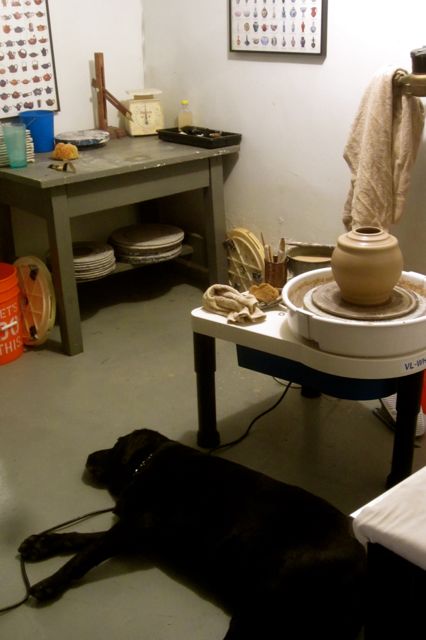
Sometimes when I travel, emerging from my car with Kai, my black lab in tow, I am asked by those who stop to pet him (they always stop to pet him) if he is a service dog. I suppose it is because Kai has a sort of Zen quality about him most days. He is soft and gentle, kind and engaging, and he is content to stay where he is (a trait more because he sleeps a lot than that he is patient – though, he is patient.)
Kai is not a service dog per se. I am not blind, nor am I epileptic. I do not need Kai to protect me or to guide me across the street or get the remote on the other side of the room (though the latter would be nice if he ever offered.) And yet I would say, with quiet confidence, that Kai is a service dog for me. I am in recover from my life and Kai soothes me in that recover process. My life is like most lives – there are pains back there. Evil monk-bishops, stupid new bishops, sneaky clergy, evil stepmothers, absent fathers, alcoholics or worse, dry-drunks, neighborhood bullies, controlling bosses, unkind spouses, manipulative teachers – the list goes on and on like a list of “wanted, dead or alive” posters in the saloons of our psyches. I think many of us are in a “recovery mode” of some kind from what cards life has dealt us. And those whose life-trauma is substantial but are not in recovery, are people, I find, who are the most dangerous to be around, since they are not even able to see their own socio-pathologies nor willing to slow down enough to face their demons with the courage such work requires to bring peace to themselves and the world around them.
This is my pottery studio, tucked rather inelegantly behind the water heater and the furnace. A bare light bulb suffices for light and the gas pipes hold my towels for me. Kai sleeps nearby, as he always does, as if placing his body between me and the doorway – the world – the danger. And I am grateful to him for that. This is my chapel. It is a silent place of generatively.
Kai has been sent to me to teach me things and I am slowly learning them. He teaches me things like kindness ( he seems incapable of being mean or sneaky,) forgiveness (he has a three-second-resentment-window and then wags his tail) and staying (he is able to remain in one place feeling one thing for a long time.)
This last thing he teaches me – the staying thing – is what I am most working on nowadays. It is so hard to stay with feelings, to stay with people, to stay with jobs, to stay with life. As an American of some modest means, I am trained by my society to make change when something does not go my way. Something breaks, I demand a refund. Something hurts, I get lawyer and sue. Something insults, I get an opportunity to defend and then insult back. Something does not go my way, I work to force my way.
But to stay with pain or discontent without racing to promote my American right to have a perfect life is an ancient, eastern and often lost art. Our usual response to pain (or to the suffering I allow myself to draw from my pain like water from a well) … our usual response to pain is one of three things.
1. We go limp and dull out with depression or frequent illness or television.
2. We get angry and take aim at whatever we think is responsible for our discomfort.
3. We crave something which will dull the pain.
We dull, we strike or we crave.
These three responses seem to be our frequent go-to when we encounter pain. But what Kai reminds me is that simply staying with a pain and working with it so that I learn to increase my tolerance for change and my ability to encounter the reality deep within me is a valuable life-learning; rare in our society, but what may be what our scriptures call “the pearl of great price.”

